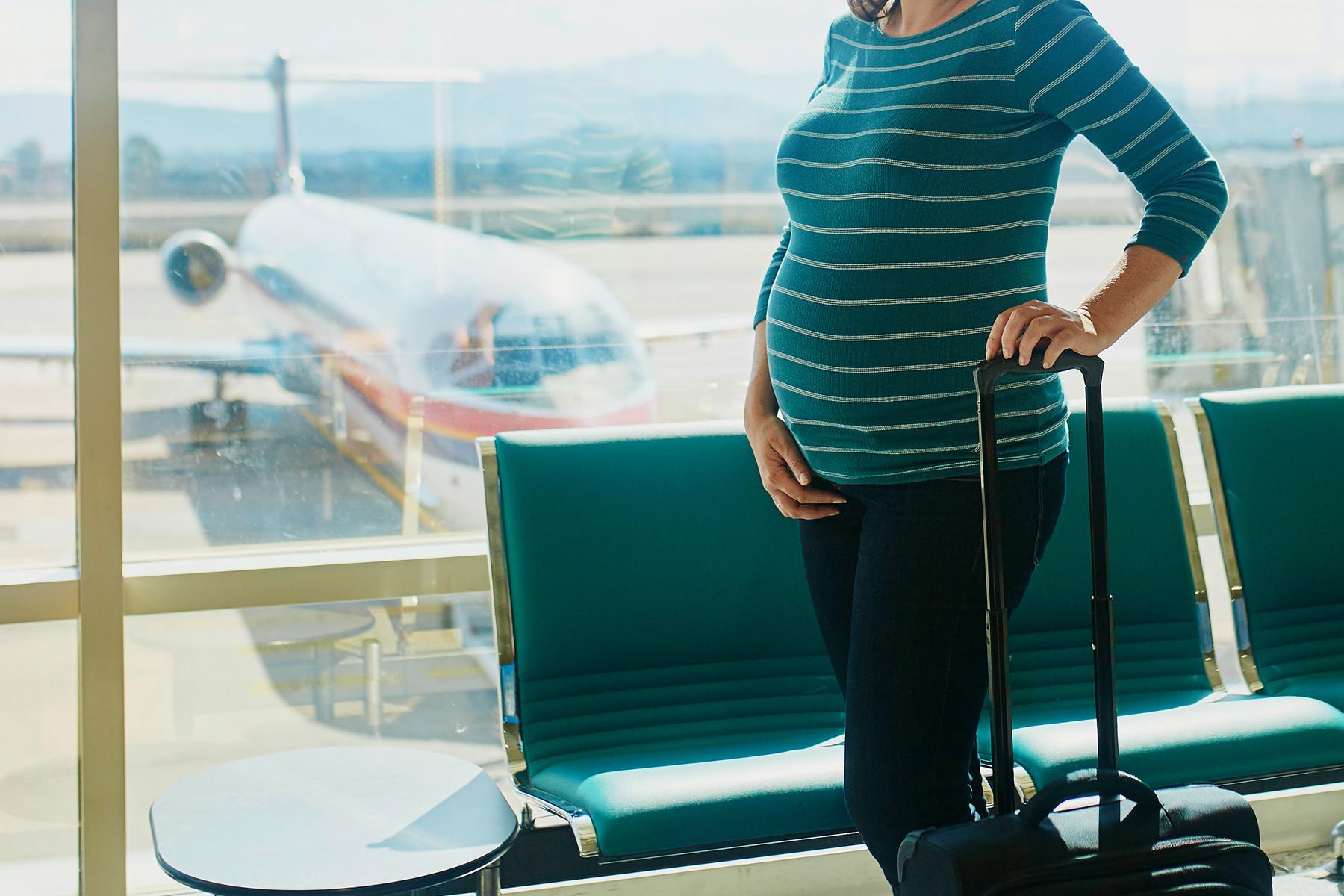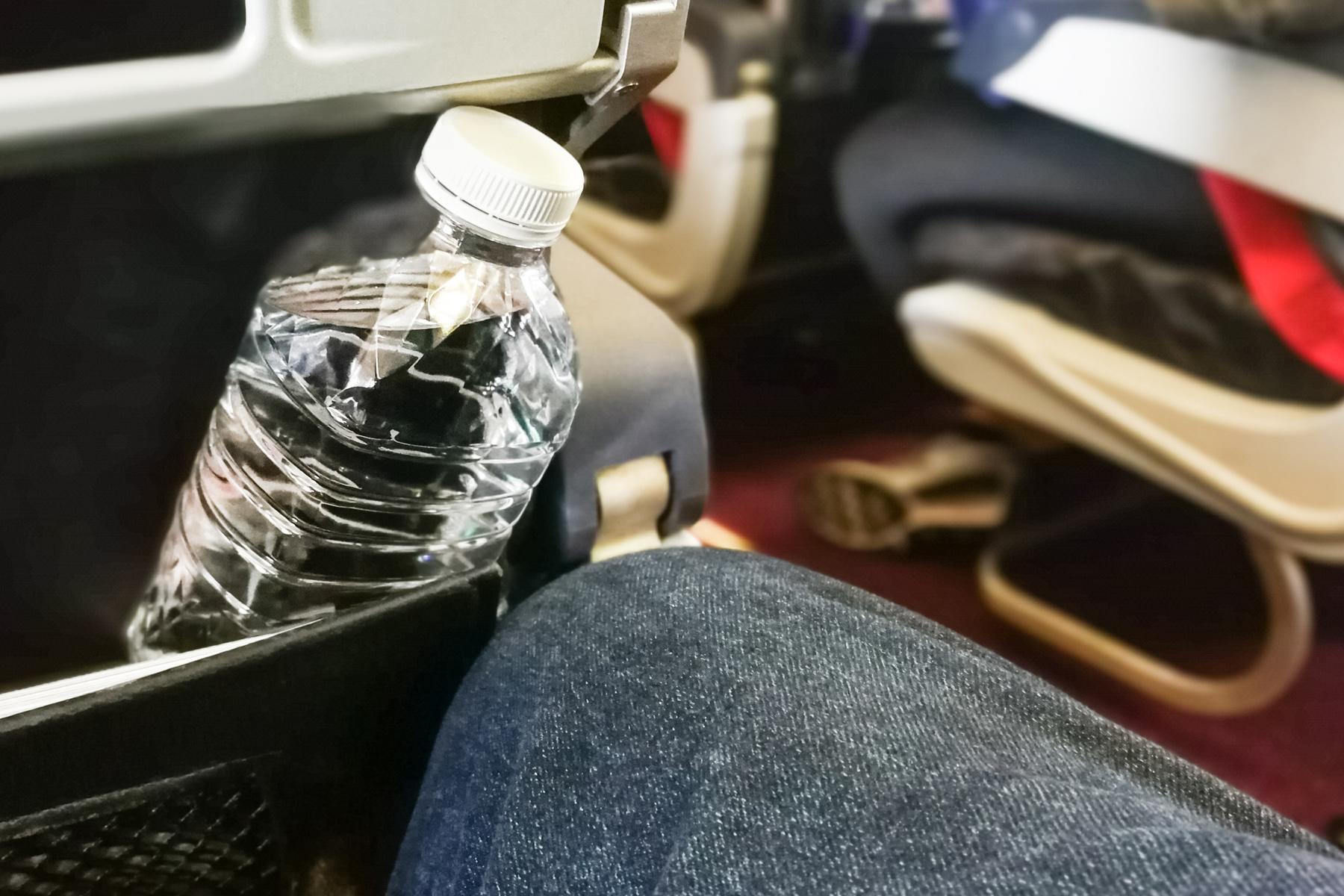Everything You Need to Know About Flying While Pregnant
By Kristy Alpert
With a little bit of planning, you can minimize the nuisances that pop up when you’re traveling while pregnant.
Your growing bump doesn’t have to put a bump in your travel plans. Although traveling while pregnant isn’t completely free of hassles and difficulties (NOTE: no travel is ever hassle-free), there will never be a time again when traveling with your baby is so easy. Most women are able to fly safely until 36 weeks pregnant, provided both mom and baby are healthy. Whether it’s for a work trip or vacation, here are a few things to keep in mind when traveling while pregnant.
Compression Socks Are Non-Negotiable
Pregnant women are more susceptible to blood clots while flying, a condition known as deep vein thrombosis (DVT) that happens when blood moves too slowly through the deep veins of the legs and pelvis. A good pair of knee- or thigh-length compression socks will help keep blood flowing while in air, and can even help relieve sore or swollen feet while traveling to and from the aircraft.Continue Reading Article After Our VideoRECOMMENDED FODOR’S VIDEO
The First Trimester Is Rough, Regardless of Flight Class
No matter which class you travel in during the first trimester, prepare for a few rough rides. Motion sickness, morning sickness, and a heightened sense of smell mean that anything from a strong perfume, steaming cup of coffee, or mild turbulence could send your stomach turning in flight. The front of the plane and the seats over the wing offer the smoothest rides, but don’t be afraid to be vocal about telling people you’re pregnant—since you likely won’t be showing at this point—so they can help you with bags and will be a bit more understanding when/if you need to rush to the bathroom mid-flight.
INSIDER TIPSucking on Preggie Pops can help ease nausea on the ground or in-flight, but also grab an empty disposable travel mug (with a lid) before your board so you can be a bit more discreet if/when you do get ill in-flight. Beats using the air sick bags!
It Helps to Book an Aisle Seat
Even if you’re typically a window girl, the aisle seat is going to be the best choice throughout your pregnancy. Having an easy route to the aisle for those frequent trips to the bathroom or for walking around to stretch your legs will make the flight more enjoyable for you and your seatmates.
You May Need to Stop Traveling Internationally at Around 28 Weeks
If you can avoid it, many doctors recommend ceasing international travel after you reach 28 weeks with your pregnancy. The American College of Obstetricians and Gynecologists agrees, adding that many airlines won’t allow pregnant passengers to travel domestically or internationally after 28 weeks without a signed note from their physician.

You May Need to Stop Traveling out of State Around Week 36
Again, if you can avoid it, most doctors recommend ceasing all plane travel no later than 36 weeks in the pregnancy. The grounding date is even earlier for women having multiples, where many doctors recommend avoiding plane travel as early as 32 weeks into the pregnancy. Although it’s possible to get a doctor’s note to allow for travel after these deadlines on some airlines (Alaska Airlines, American Airlines, Delta Airlines, Frontier Airlines, etc.) the main concern is that women may need to be near a medical facility this late in the pregnancy in case anything unexpected happens.
It’s Important to Get Up Every Two Hours
The CDC specifically warns pregnant women about traveling on anything longer than a four-hour flight, but luckily the warning stems from the time spent motionless than it does from the time spent in air. For any flight longer than a few hours, make sure to get up every two hours to use the restroom or walk around for at least five minutes to get circulation back in your legs.
You Can Sometimes Board Early
Families traveling with small children or passengers with disabilities get priority in early boarding, and for good reason, but pregnant passengers can often get pre-boarding privileges as well in some cases. Although no airline has a pre-boarding policy for pregnant women, when asked nicely, many gate agents will allow pregnant passengers to board alongside early boarders to allow for more time to get settled in your seat.
INSIDER TIP Keep in mind that the odds of getting assistance with your bags increase the fuller the plane gets, and, if you’ve booked an aisle seat, you may have to get up multiple times to allow other passengers through.
You May Need to Get Cleared By Your Doctor
Most airlines require a signed note from a doctor allowing pregnant passengers to fly after week 28 of the pregnancy (or if you even look like you might be 28 weeks pregnant), but some airlines have a stricter policy than others and require medical certificates, vaccine records, and more. It’s also wise to check with your doctor prior to travel to make sure you’re up to date on any travel restrictions in your destination. Zika is still prevalent in some countries, and the risk of developing food-borne viruses increases with travel to certain countries.
Every Airline Has a Different Policy for Pregnant Travelers
Always check your airline’s policies for pregnant women well before travel, since some airlines, like Cathay Pacific, require a detailed medical certificate dated 10 days prior to travel. A few airlines don’t have any restrictions for pregnant travelers, but some will deny travel if their requirements aren’t met, like United Airlines, which has a policy that requires women traveling in the ninth month of their pregnancies to carry two copies and an original medical certificate for the allowed dates of travel dated no more than 72 hours from takeoff.
It’s Okay to Ask for Help
If you’re unable to check a bag, try to pack as light as possible to avoid carrying any strain on your body while walking through the airport. Once on the plane, don’t be afraid to ask a flight attendant for help lifting anything above your head (heavy or not), especially in the early months when you’re not showing and people are less likely to offer assistance.
From My Experience: I’ve flown more than 20 times since finding out I was pregnant, and have noticed passengers in Economy class are quick to offer help with my bags without being asked, while passengers in Business Class rarely offer assistance unless asked.

Airline and Airport Employees Are Often Willing to Help Out
Comfortable passengers are happy passengers, which is why many pregnant women will find flight attendants happy to help make the journey more comfortable for them. Feel free to ask for an extra pillow, blanket, or seatbelt extender if you are unable to wear the seatbelt low and snug beneath your bump. Even prior to boarding, TSA officials will perform a full-body pat down if you are uncomfortable walking through the X-ray scanner for whatever reason.
High Altitude Isn’t an Issue…in Most Cases
Most commercial airplanes cruise at an altitude of 35,000 feet; that’s 6,000 feet higher than Mount Everest! However, since most commercial flights take place in pressurized aircraft, you and your baby are not likely to feel the effects of being so high in the air. Certain pregnant passengers (i.e., high-risk pregnancies, women with a history of preeclampsia, etc.) should avoid flying in non-pressurized cabins for extended periods of time as it limits the amount of oxygen she will be able to supply to the baby. Always check with your doctor before flying on any aircraft.
It May Be Time to Rethink Travel and Flight Insurance
Even if you’re someone who never gets the insurance, a lot can happen between conception and birth. Flight and travel insurance can offer great peace of mind to know you’re covered if you need to cancel your travel plans last minute for whatever reason, especially since many airlines will not waive ticket and change fees for pregnancy.

Hydrate, Hydrate, Hydrate!
Dehydration is a major concern for pregnant women whether traveling or not, but it’s even more important while in the air. The low oxygen and low humidity of an aircraft decreases hydration in the body and can lead to swelling of the feet and hands. Bring an empty water bottle through security and make sure to fill up before flight and drink up while inflight to keep blood flowing to your baby while in the higher altitude environments. Worried you’ll have to rush to the bathroom even more frequently? That’s where booking an aisle seat comes in handy!
Pack Portable Snacks
Although it’s a myth that you’re eating for two while pregnant—the Academy of Nutrition and Dietetics recommends women consume just 340 calories more during the second trimester and 450 more during the third—there’s no denying that hunger comes more frequently while pregnant. Avoid processed foods at the airport by bringing your own healthy snacks like veggies, nuts, and dried fruit, and make sure to pack some extra fiber because, well, travel constipation is no joke.

